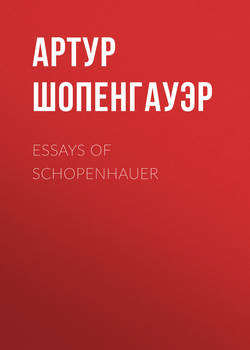Essays of Schopenhauer

Реклама. ООО «ЛитРес», ИНН: 7719571260.
Оглавление
Артур Шопенгауэр. Essays of Schopenhauer
PRELIMINARY
BIOGRAPHICAL NOTE
ESSAYS OF SCHOPENHAUER. ON AUTHORSHIP AND STYLE
ON NOISE
ON READING AND BOOKS
THE EMPTINESS OF EXISTENCE
ON WOMEN
THINKING FOR ONESELF
SHORT DIALOGUE ON
RELIGION
PSYCHOLOGICAL OBSERVATIONS
METAPHYSICS OF LOVE
PHYSIOGNOMY
ON SUICIDE
Отрывок из книги
Arthur Schopenhauer was born at No. 117 of the Heiligengeist Strasse, at Dantzic, on February 22, 1788. His parents on both sides traced their descent from Dutch ancestry, the great-grandfather of his mother having occupied some ecclesiastical position at Gorcum. Dr. Gwinner in his Life does not follow the Dutch ancestry on the father's side, but merely states that the great-grandfather of Schopenhauer at the beginning of the eighteenth century rented a farm, the Stuthof, in the neighbourhood of Dantzic. This ancestor, Andreas Schopenhauer, received here on one occasion an unexpected visit from Peter the Great and Catherine, and it is related that there being no stove in the chamber which the royal pair selected for the night, their host, for the purpose of heating it, set fire to several small bottles of brandy which had been emptied on the stone floor. His son Andreas followed in the footsteps of his father, combining a commercial career with country pursuits. He died in 1794 at Ohra, where he had purchased an estate, and to which he had retired to spend his closing years. His wife (the grandmother of Arthur) survived him for some years, although shortly after his death she was declared insane and incapable of managing her affairs. This couple had four sons: the eldest, Michael Andreas, was weak-minded; the second, Karl Gottfried, was also mentally weak and had deserted his people for evil companions; the youngest son, Heinrich Floris, possessed, however, in a considerable degree the qualities which his brothers lacked. He possessed intelligence, a strong character, and had great commercial sagacity; at the same time, he took a definite interest in intellectual pursuits, reading Voltaire, of whom he was more or less a disciple, and other French authors, possessing a keen admiration for English political and family life, and furnishing his house after an English fashion. He was a man of fiery temperament and his appearance was scarcely prepossessing; he was short and stout; he had a broad face and turned-up nose, and a large mouth. This was the father of our philosopher.
When he was thirty-eight, Heinrich Schopenhauer married, on May 16, 1785, Johanna Henriette Trosiener, a young lady of eighteen, and daughter of a member of the City Council of Dantzic. She was at this time an attractive, cultivated young person, of a placid disposition, who seems to have married more because marriage offered her a comfortable settlement and assured position in life, than from any passionate affection for her wooer, which, it is just to her to say, she did not profess. Heinrich Schopenhauer was so much influenced by English ideas that he desired that his first child should be born in England; and thither, some two years after their marriage, the pair, after making a détour on the Continent, arrived. But after spending some weeks in London Mrs. Schopenhauer was seized with home-sickness, and her husband acceded to her entreaties to return to Dantzic, where a child, the future philosopher, was shortly afterwards born. The first five years of the child's life were spent in the country, partly at the Stuthof which had formerly belonged to Andreas Schopenhauer, but had recently come into the possession of his maternal grandfather.
.....
The man who publishes and edits an article written by an anonymous critic should be held as immediately responsible for it as if he had written it himself; just as one holds a manager responsible for bad work done by his workmen. In this way the fellow would be treated as he deserves to be – namely, without any ceremony.
An anonymous writer is a literary fraud against whom one should immediately cry out, "Wretch, if you do not wish to admit what it is you say against other people, hold your slanderous tongue."
.....